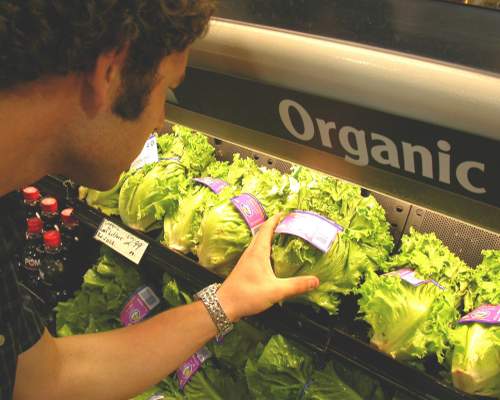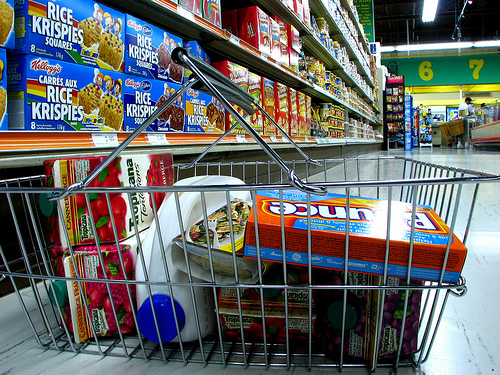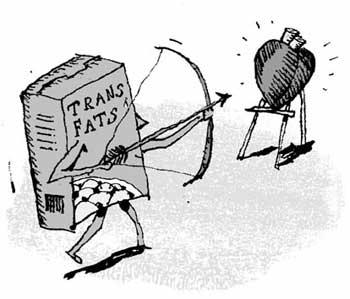Benefits of organic food doubtful
 The organic debate rages on with further suggestions that ‘organic’ doesn’t necessarily mean ‘healthy’. There is currently no strong evidence to show that organic produce provides greater health benefits than conventional farming. More importantly, there is absolutely no doubting the fact that organic farming is entirely unsustainable on a broad scale.
The organic debate rages on with further suggestions that ‘organic’ doesn’t necessarily mean ‘healthy’. There is currently no strong evidence to show that organic produce provides greater health benefits than conventional farming. More importantly, there is absolutely no doubting the fact that organic farming is entirely unsustainable on a broad scale.
Supermarket foods a toxic asset
 Sticky labels on some foods are full of a highly toxic chemical which can bleed through into the packets’ contents, scientists have found. One of the adhesives used in packaging is classed in the same ‘toxic’ category as mercury, asbestos, and hydrochloric acid. I’m tempted to say this is flagrant scaremongering – what do you think?
Sticky labels on some foods are full of a highly toxic chemical which can bleed through into the packets’ contents, scientists have found. One of the adhesives used in packaging is classed in the same ‘toxic’ category as mercury, asbestos, and hydrochloric acid. I’m tempted to say this is flagrant scaremongering – what do you think?
Anti trans fat move has a positive effect
 There were concerns that banning one egregious foodstuff would lead to it simply being replaced by another. But it seems that restaurants in the U.S. are making an effort to swap naughty trans fats with healthier alternatives. Perhaps chains aren’t the unethical sorts we thought they were.
There were concerns that banning one egregious foodstuff would lead to it simply being replaced by another. But it seems that restaurants in the U.S. are making an effort to swap naughty trans fats with healthier alternatives. Perhaps chains aren’t the unethical sorts we thought they were.
*****
Other food news this week:
* Illegal fishing practices remain unchecked, according to BBC reports.
* Prince Charles criticizes the cost of wasted food.
* Following the launch of Chipotle, Taco Bell is now opening in the UK.
* Supermarket alcohol concerns continue to grow, with the WHO weighing in (that’s the World Health Organisation, not Roger Daltry).
***
Blog of the week
A compelling debate from Tim Hayward about whether cheese or dessert should come first. What do you think?
Recipe of the week
A beautiful, summery cocktail by the Daily Spud. The Cucumbert.
Good cause of the week
Chefs unite against Leukaemia. A very worthwhile cause. Click here for details.
Video of the week
Finally, an improvement in the fare offered by airlines:
Thanks for the mention! And, by the way, when it comes to the sequencing of cheese and dessert, I am wholly won over by Tim Hayward’s argument for pud and then cheese as the herald of a long and pleasant evening to come.
I’m pretty sure that most people can agree that conventional and organic produce have the same nutritional profile. Very few people argue the contrary. The reason that more and more people are consuming organic foods is because of the lack of pesticides, herbicides, and artificial fertilizer’s used. There have been an overwhelming amount of studies done on the negative effects caused by these, but very few have been done taking into consideration the combination of different pesticides and herbicides in the body.
Organic farming is very sustainable on a broad scale, it’s been used since the beginning of agriculture. What is not sustainable is expecting to grow the produce and ship it around the world. Local, organic produce is cheaper than imported conventional produce. No one expects organic food to feed the everyone, or those in Africa or places were it is just not logical to have.
Conventional farming is also very taxing on the environment. Phosphorus and other elements found in fertilizers end up in our water systems, which ultimately lead to algal blooms, that degrade our oceans. Pesticides and herbicides also cause insects to become more resistant, calling for increased usage and the use of more potent chemicals. These chemicals affect us as well, we eat the food, some of the toxins such as DDT accumulate in our fat tissues. DDT is outlawed in the U.S.A and EU, but is used in third world countries where we get our produce from.
Organic food also “tends” to be healthier because of the limited products available. They are made using natural ingredients, which tend to be better than the synthetic ones. That is what people mean by healthier. A tbsp of oil is a tbsp of oil, it doesn’t matter if its organic or not, but a tbsp of sugar vs a tbsp of high fructose corn syrup is obviously going to have a different nutritional profile.
Tell me what you think!
-Andres